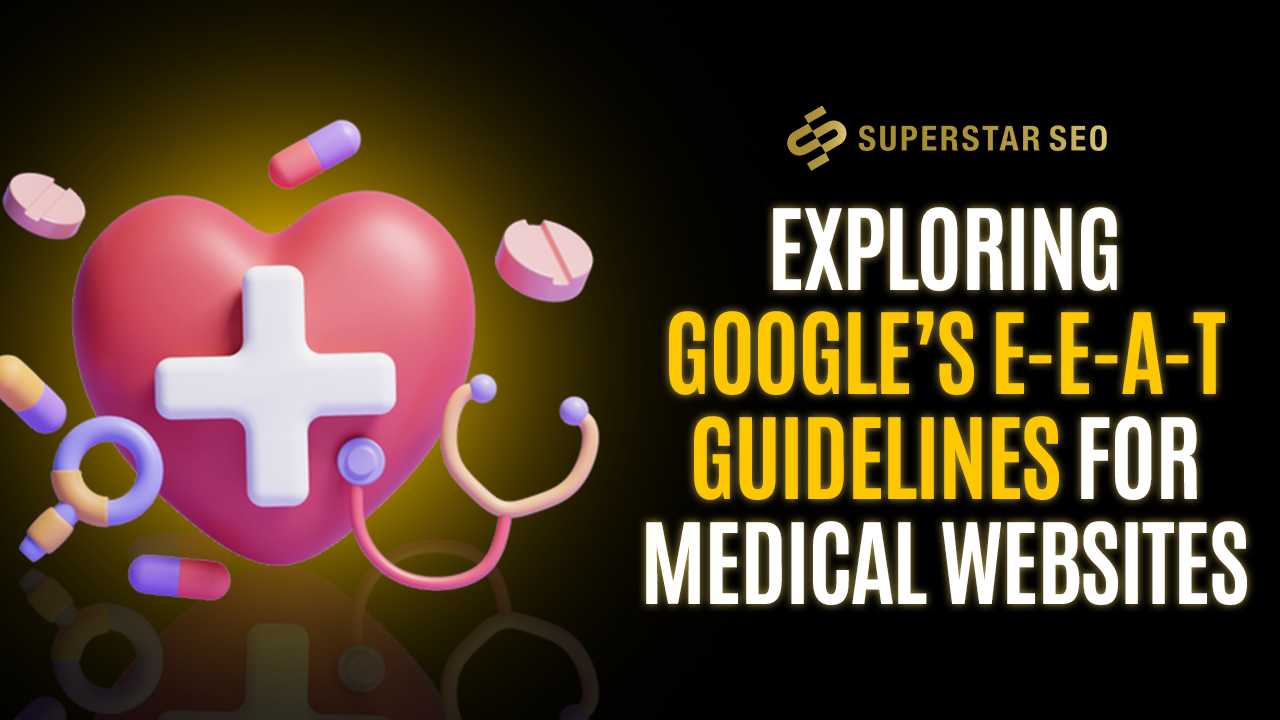Establishing a strong online presence is crucial for any business, including those in the healthcare industry. Particularly for medical services, where trust and credibility are paramount, having a well-optimized website is key to attracting and retaining patients. This is where SEO for medical services plays a vital role.
However, not just any SEO strategy will do; understanding and implementing Google’s E-E-A-T (Experience, Expertise, Authoritativeness, and Trustworthiness) guidelines is essential. These guidelines have become increasingly important for medical websites, ensuring that the information provided is not only accurate but also comes from reliable and authoritative sources.
In this blog, we delve into the world of E-E-A-T and explore how it specifically applies to SEO for medical services. Whether you’re a healthcare provider looking to enhance your website or a digital marketer specializing in the healthcare sector, this guide will provide valuable insights into optimizing your online presence in a way that aligns with Google’s trusted standards.
Let’s begin our journey into understanding and mastering E-E-A-T for medical websites.

Understanding E-E-A-T
E-E-A-T, which represents Experience, Expertise, Authoritativeness, and Trustworthiness, is Google’s method for guaranteeing that users access the most pertinent and dependable information, especially in critical areas such as healthcare.
Even though Google’s E-A-T isn’t considered a direct ranking factor in SEO, it significantly influences other metrics that directly impact Google search rankings.
When it comes to SEO for medical services, E-E-A-T is more than just a suggestion; it’s an essential standard to meet. Here’s a breakdown:
Experience: This refers to the practical knowledge or skill acquired by a content creator or website in the healthcare field. It’s about showing users that the information is provided by someone who knows the industry well.
Expertise: This is about having specialized knowledge in the medical field. Expertise ensures that the content on health and medical websites is accurate and comprehensive.
Authoritativeness: This aspect looks at the credibility and recognition of the website and content creators. It gauges whether the source is considered an authority in the medical field.
Trustworthiness: Perhaps the most crucial, trustworthiness measures the reliability and honesty of the content and website.
In sum, E-E-A-T is essential for SEO success in the healthcare industry. It’s about proving to Google, and more importantly to users, that your site is a reputable source for medical information and services.
Experience in the Context of Medical Services
When discussing SEO for medical services, ‘Experience’ within the Google E-E-A-T framework plays a pivotal role. It’s about demonstrating hands-on knowledge and real-world involvement in the healthcare sector.
For a medical website, showcasing experience means providing content that reflects practical expertise in healthcare topics. This could be through detailed case studies, patient testimonials, or insights from medical professionals who directly engage with patients.
Experience is conveyed through the depth of content and its relevance and applicability to real-life medical situations.
For instance, a blog post on a medical website that offers practical advice, derived from actual patient care experiences, resonates more effectively with the audience. It reassures visitors that the information they’re receiving is grounded in genuine healthcare practice, thereby enhancing the site’s value in terms of SEO for medical services.
In essence, the ‘Experience’ aspect of E-E-A-T for a medical website is about bridging the gap between theoretical knowledge and practical healthcare application.
Expertise: A Pillar of Trust in Healthcare
In medical services, ‘Expertise’ is a cornerstone, ensuring that the information provided is not only accurate but also delivered by knowledgeable professionals. This element of the E-E-A-T framework is especially crucial in healthcare, where the accuracy of information can have significant implications for patient health and well-being.
Expertise in healthcare content creation is demonstrated through the credentials, education, and professional background of the content creators. It’s about having qualified healthcare professionals, such as doctors, nurses, or specialists, either authoring or substantiating the content.
For a medical website, this could mean including author bios that highlight their qualifications, publishing peer-reviewed research, or providing in-depth analyses of medical conditions.
By showcasing expertise, a medical website builds trust with its audience. Patients and visitors are more likely to rely on and return to a website that consistently provides expert-driven, authoritative content. In turn, this trust bolsters the website’s SEO for medical services, as search engines favor content that exemplifies high levels of expertise.
Authoritativeness in Healthcare Digital Marketing
Authoritativeness is a critical component in the realm of SEO for medical services, acting as a badge of credibility and respect in the healthcare community. It’s not just about what you know, but about how your expertise is recognized and valued by others, particularly in the digital space.
In healthcare digital marketing, this means establishing your website or medical practice as a go-to source for trustworthy information.
Building authoritativeness involves several strategies. First, it’s crucial to create content that is not only accurate but also cited and referenced by other reputable sources. This can include links from authoritative medical sites, mentions in respected healthcare publications, or collaborations with well-known medical experts.
Additionally, positive patient reviews and ratings, especially on third-party platforms, enhance the perception of authoritativeness.
When a medical service website is viewed as an authority, it gains a significant boost in SEO. Search engines prioritize sites that are recognized by their peers and audiences as leading sources of information. Therefore, investing in building authoritativeness is essential for any effective digital marketing strategy in the healthcare sector.
Trustworthiness: Essential for Medical Websites
Trustworthiness is the foundation of any medical website’s credibility, especially when it comes to SEO for medical services. It’s about ensuring that your site is not just a repository of information, but a reliable and safe source for health-related advice and services. In the healthcare industry, where misinformation can have dire consequences, the trustworthiness of your content is paramount.
To establish trustworthiness, medical websites must adhere to strict ethical standards and transparency. This includes accurately representing the qualifications of healthcare providers, providing evidence-based information, and clearly disclosing any potential conflicts of interest.
Additionally, ensuring website security, such as using HTTPS protocols, protects user data and builds visitor confidence.
Search engines like Google place a high premium on trustworthiness, particularly for YMYL (Your Money or Your Life) sites, which include healthcare services. Sites that demonstrate a high level of trustworthiness are more likely to rank well, making it an essential aspect of SEO for medical services.
Ultimately, a trustworthy site not only ranks better but also fosters a stronger, more loyal patient base.
Enhancing Credibility for Medical Websites with Google Search Quality Rater Guidelines
For health and medical websites, adhering to Google Search Quality Raters Guidelines is indispensable in bolstering credibility and trustworthiness. These search quality guidelines serve as a benchmark for ensuring that your content meets stringent quality standards, contributing to a higher overall page quality rating and improved visibility in search results. By aligning your content creation efforts with Google’s quality rater guidelines, you demonstrate your commitment to providing reliable healthcare information and fostering a secure online environment.
Improving User Experience and Search Intent with Intuitive Site Search Functionality
Optimizing user experience is paramount in the healthcare sector, where users often have specific search intent related to medical queries. Implementing intuitive site search functionality not only enhances user satisfaction but also aligns with Google’s emphasis on delivering relevant search results. By understanding user search intent and integrating site search features, medical websites can streamline navigation and facilitate access to authoritative healthcare information. Moreover, optimizing site search contributes to a higher overall page quality rating and enhances the effectiveness of your content strategy.
Engaging Audiences and Amplifying Reach through Strategic Social Media Posts
Social media platforms offer unparalleled opportunities for health and medical websites to engage with their audience and amplify their reach. Crafting strategic social media post that highlight adherence to Google’s Search Quality Rater Guidelines and showcase user-friendly features like site search can reinforce credibility and trust. Additionally, leveraging platforms like Google Business Profile and Google Search Console can provide valuable insights into user behavior and inform content strategy. By embracing social media as a key component of your digital content marketing strategy, you can foster meaningful interactions and establish your brand as a trusted source of healthcare information.
The Benefits of Implementing E-E-A-T
Incorporating the E-E-A-T guidelines into the SEO strategy for medical services reaps numerous benefits, both in terms of search engine rankings and user engagement. Understanding these benefits can help medical professionals and digital marketers optimize their online presence effectively.
Improved Search Engine Rankings
The most direct benefit of implementing E-E-A-T is enhanced visibility on search engine results pages (SERPs). Google’s algorithms are increasingly prioritizing content that aligns with these principles, especially for healthcare-related queries.
Websites that demonstrate high levels of expertise, authoritativeness, and trustworthiness are more likely to appear at the top of search results, driving more organic traffic to the site. This improved ranking is not just about being seen; it’s about being recognized as a credible and reliable source of medical information.
Enhanced User Trust and Credibility
In the healthcare industry, trust is a critical factor. When medical services websites exhibit strong E-E-A-T characteristics, they build and maintain the trust of their users. This trust is not only crucial for retaining existing patients but also for attracting new ones.
Users are more likely to engage with and return to a site that they perceive as an authoritative or trustworthy source. This builds a loyal user base and can increase patient acquisition rates.
Increased User Engagement and Interaction
Websites that follow E-E-A-T guidelines tend to create content that is more engaging and relevant to their audience’s needs. This leads to longer session durations, lower bounce rates, and more interactions on the site. Such engagement signals are positive indicators to search engines and can further boost the site’s rankings.
Additionally, high-quality content encourages users to share information, expanding the site’s reach and potentially attracting new patients.
Better Patient Education and Empowerment
By providing accurate, expert-backed information, E-E-A-T-compliant websites play a pivotal role in educating and empowering patients. This can lead to better health outcomes, as patients are more informed about their health conditions and treatment options.
Moreover, a well-informed patient is more likely to have productive interactions with their healthcare providers, enhancing overall patient satisfaction and care quality.
Competitive Advantage
In a crowded digital landscape, standing out is key. Implementing E-E-A-T can give a medical services website a competitive edge. It differentiates your site from others that may not adhere to these rigorous standards. In an industry where credibility is everything, having a website that exemplifies these qualities can position you as a leader in your field.
E-E-A-T is more than just a set of guidelines; it’s a strategic approach to building a strong, trustworthy, and successful online presence in the healthcare sector. By focusing on these areas, medical services websites can not only improve their SEO performance but also enhance the overall page quality of their digital engagement with patients and the broader community.
Implementing E-E-A-T in Medical Website SEO
Successfully implementing E-E-A-T in the SEO strategy for medical websites requires a thoughtful and comprehensive approach. Here are practical steps to ensure that your medical services website aligns with these crucial guidelines:
Showcase Professional Experience and Qualifications
Highlight the experience and credentials of medical professionals associated with your website. Include detailed bios, certifications, and relevant professional backgrounds. Share real-world examples and case studies that demonstrate hands-on experience in the medical field.Exhibit Expertise through Quality Content
Write SEO content that reflects in-depth knowledge of medical topics. This could include detailed articles, research summaries, and educational material. Utilize professionals with relevant medical expertise to author or review the content, ensuring its accuracy and reliabilityBuild Authoritativeness
Gain recognition from authoritative sites within the healthcare industry. This can be achieved through guest posts, collaborations, and getting cited by reputable medical publications or websites. Encourage and showcase patient reviews and testimonials to build credibility.Enhance Trustworthiness
Ensure that all information on your website is up-to-date, factual, and evidence-based. Transparency is key, so disclose any potential conflicts of interest. Invest in website security to protect patient data and privacy, which reinforces trust.Regularly Update and Optimize Content
Continuously update your website with the latest medical information and advancements. This not only demonstrates ongoing engagement with the field but also keeps your content relevant and current. Optimize content for SEO by using keywords strategically, improving site speed, and ensuring mobile responsiveness.Monitor and Adapt
Regularly assess your website’s performance in terms of SEO and user engagement. Use analytics to understand how users interact with your content and make adjustments as needed. Stay informed about updates to Google’s algorithms and adjust your strategy accordingly to maintain alignment with E-E-A-T standards.
Challenges and Considerations
While implementing E-E-A-T in SEO for medical services is crucial, it comes with its set of challenges and considerations. One of the primary challenges is the constant evolution of Google’s algorithms. Staying updated with these changes requires continuous learning and adaptation of your SEO strategies.
Another significant challenge is balancing the technical aspects of SEO with the content quality. It’s important to ensure that while optimizing for search engines, the content remains patient-focused and adheres to the high standards of medical information.
Furthermore, in the competitive healthcare industry, establishing and maintaining authority and trustworthiness is an ongoing process. It requires consistent effort to produce high-quality content and build a strong online reputation.
Lastly, ensuring compliance with privacy laws and regulations, especially when handling sensitive medical information, is crucial. This adds an extra layer of complexity to managing a medical services website.
Conclusion
Integrating E-E-A-T into your medical website’s SEO is crucial in the modern digital world. More than just improving website rankings in search engine, it builds a trustworthy and authoritative presence online, which is crucial for patient trust and credibility in the healthcare industry.
Adhering to E-E-A-T principles is a continuous effort, but it’s a commitment to providing accurate and reliable healthcare information, which is vital for patient outcomes. By enhancing your website with E-E-A-T, you’re significantly improving your digital presence and contributing to the quality of healthcare information available online.





